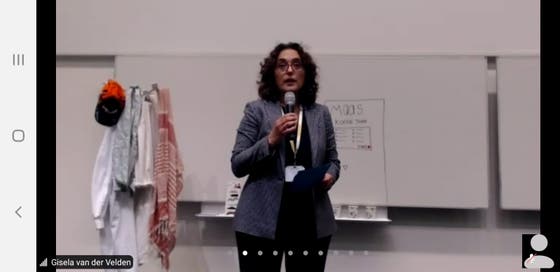Do You Belong?

On 28 September, UMC Utrecht’s Diversity and Inclusion Platform hosted a performance of the play Do You Belong? by theatre group Bint. This event helped kick off our celebration of Diversity Day on 1 October 2020. The aim of this performance was to help create a dialogue in our organisation about diversity and inclusion in a fun and light-hearted way.
Diversity Day is a day where we consciously celebrate diversity in our society and the power and value it brings to a community. Juliëtte Schouten, policy officer for the Bachelor of Biomedical Sciences, let us know what she thought of the play.
The play through the eyes of Juliëtte Schouten
Context
After the corona virus press conference on Monday, 28 September, it became painfully clear that working from home would remain the norm for the time being. In response to this news, I really needed a pick-me-up. I have to say, the month of October could not have started better. It was precisely on a Thursday, a day I had spent so pleasantly in the Hijmans van den Bergh building in recent weeks, that the online theatre piece Do you Belong? was planned in my agenda. Online is the new offline, and whatever had been planned in a room with an enthusiastic audience, now must face the extra challenge of conveying that one funny joke or beautiful message virtually. Without any prior knowledge, I sat down on the sofa with a cup of tea and a piece of chocolate and read the digital poster. In this performance by theatre group Bint, we humorously reflect on who you are and who the other is in a world that focuses on the individual. Perhaps this will lead to a reformulation of your view of the world around you. This sounded intriguing enough, so I Zoomed into the Green Lecture Hall.
Characters
From behind my screen, I met Aisha, Janny, Shekib, Harrie and Piet. Or well . . . I met Bint's two actresses who portrayed these evocative and humorous characters. We first meet Janny, a middle-aged woman who believes that we should always take care of people with a minority background and who is a little too happy to fill in their personal stories. Next we met Aisha, a young woman from a minority background who thinks it is safe to discuss minority issues with people like Janny. The next character was Shekib, the youngest in the group. Shekib is an intern who just wants to go through his studies as normally as possible and prefers to keep his mouth shut in uncomfortable situations. The last two characters we meet are two middle-aged men named, Harrie and Piet. Piet mainly thinks that others should adapt, while Dr. Harrie emphasises that we should not discriminate in the opposite direction.
Uncomfortable Situations
Janny had recently watched a documentary about arranged marriages and wanted to share her thoughts with Aisha and asked her if she were honestly happily married. Aisha, understanding that Janny did not mean her any harm but also wanting to highlight the hypocrisy of asking that question, managed to fool Janny by telling her that the wedding deal had almost ended on a camel.
Shekib stood in the OR with Dr. Harrie, when he was questioned by the doctor about where he was from. Not satisfied with Utrecht, Harrie then proceeded to ask Shekib where he really was from? Surely his parents weren't from here?!
What would you do?
The first thing I thought was, Naaah, this is not possible! Is this really happening? Of course, the above mentioned situations were considerably exaggerated, but it became clear from the personal stories in the live and digital audience that this is indeed happening. Through break-out rooms and accompanying questions in Mentimeter, I struck up conversations with UMC colleagues and students. It soon became apparent that you have to be quite a mentally strong person to be on the receiving end of one of these situations and that the hierarchy in the hospital certainly does not help matters.
I think it is also good to draw attention to such situations, because the Harries and Jannies in our midst may be completely unaware of the uncomfortable or even discriminatory questions they are asking. It made me think, Am I not sometimes a Janny, who, driven by enthusiasm, asks questions about someone who may not want those types of questions? This made me think about how, as long as we dare to be open and honest, there is room for an interesting dialogue from which every person can learn something. However, there is still a long way to go if that safe environment is lacking.
Want to know more about our bias training or maybe organise your own training programme within your department? Send us an email at belonging@umcutrecht.nl.
